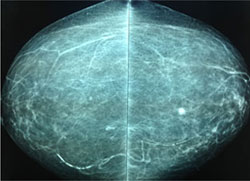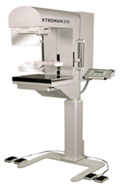 Breast cancer is the number one cancer killer in the city of Mumbai. Mammography is a screening tool for breast cancer. We employ advanced technology and trained technologiststo improve diagnostic quality and maximize patient comfort.
Breast cancer is the number one cancer killer in the city of Mumbai. Mammography is a screening tool for breast cancer. We employ advanced technology and trained technologiststo improve diagnostic quality and maximize patient comfort.
Mammography is an important investigation, which helps detect breast cancer even before it becomes palpable or causes any symptoms. This allows for early and effective treatment. It is a continuum of physical examination of breast.
Physical examination is also important because pre-menopausal breast tissue is often dense and fibrous, which may decrease the reliability of mammography for young women.Breast Self-Examination or BSE is palpation of the breast by women with their own fingers to look-out for lumps.
Who should undergo mammography? And how often? Cancer
- Normal women over 50 years : All women over the age of 50 years should have annual mammography examinations.
- Normal Women between 40-50 years : The American Cancer Society recommends that these women get a mammogram every 1-2 years. Your physician should offer appropriate guidance on this issue according to your personal medical history.
- Normal Women Under 40 years : Most women under the age of 40 years do not need annual mammograms. However a baseline mammogram may be done at 35 years.
- Symptomatic Women: It is also recommended for patients with lumps, nipple discharge, patients with skin discoloration or patients with lumps in the armpit. All these symptoms can occur in breast cancer and it is advisable to do mammography to be sure.
- Women with Family History: The Screening program should start earlier in such women and should include more frequent follow-up examinations.

What preparations are required for mammography?
No preparation or fasting is required and the test can be performed anytime. Please do not use any powders or deodorants on the breasts or armpits prior to this procedure as these give rise to artifacts on X-Rays. Kindly carry any previous mammography reports and films along with you when you come for the test.
How is it performed and who performs the test?
Before the procedure is performed, our doctors will elicit your relevant clinical history and assess your past medical records. Following this, you will be asked to change into a hospital gown. Trained technologists will then perform X-ray mammography under the supervision of our doctors. This test is performed on specialized and dedicated Mammography equipment. The technologist will position you on the machine and apply gentle compression on the breast tissue. Usually, two views of each breast are performed. Based on the findings your doctor may recommend additional views.
Is the procedure of mammography painful?
No. With newer, advanced equipment and well-trained technologists the discomfort caused by breast compression is minimal.
What is the sono-mammography? Is it necessary to undergo Sono-mammography?
Sono-mammography is sonography of the breasts. It is usually done as a complimentary procedure to mammography. It helps in better characterizing the lesions seen on X-ray Mammography. In patients with dense breasts the sensitivity of X-ray Mammography is reduced and in such cases sono-mammography is often useful.
If we find something on the mammogram, what is the next step?
Any lesion identified on mammography will be categorized according to the BIRADS classification system. Every category on the BIRADS classification system has clear instructions regarding further management plan. Our doctors will counsel you regarding the further management needed. Please do not hesitate in approaching our doctors to clear any doubts you may have.
If a close relative has breast cancer, am I at an increased risk of developing breast cancer?
Yes, especially if there is a history of breast cancer on the maternal side. There are multiple genetic factors at play. Frequent follow up examinations are required to detect breast cancer early.
Does mammography itself cause breast cancer because of radiation?
The radiation exposure with mammography is very less and the pros far outweigh the cons. Pregnant women should not undergo mammography unless strongly indicated.